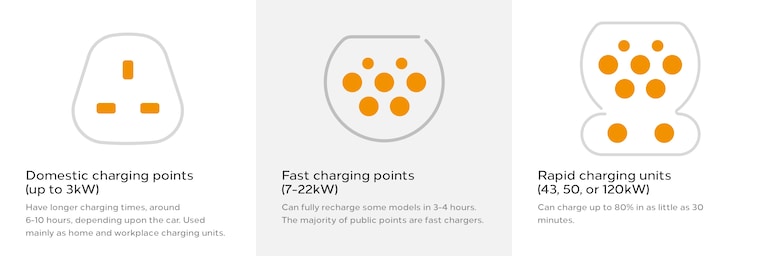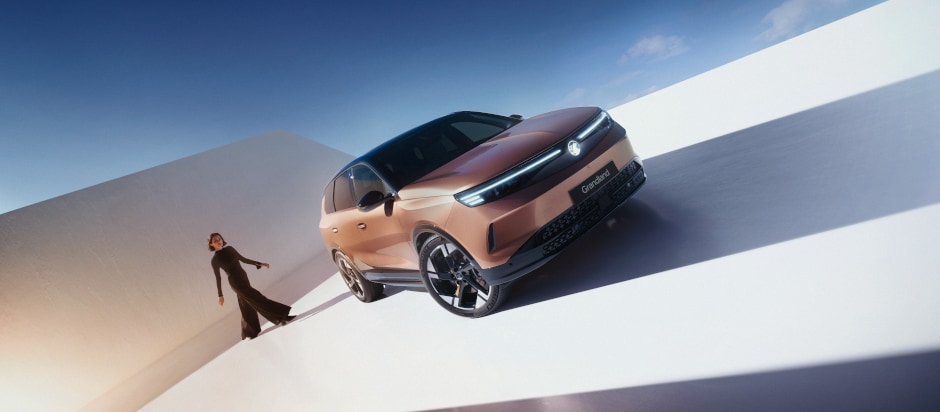Frequently asked questions
Making the switch to electric can come with a lot of questions. You’ll find our most commonly asked questions about electric vehicles here.
How does the 2030 ban on petrol and diesel vehicles affect me?
As part of the UK government’s commitment to net-zero carbon emissions, brand new petrol and diesel powered vehicles will no longer be sold in the UK in 2030. Hybrids, however, will be available until 2035, but only if the vehicle can deliver a ‘significant zero-emission range’ on electric alone.
Until then, you’ll still be able to buy petrol and diesel vehicles. And they won’t be banned from UK roads once we reach that date - you just won’t be able to buy a new car or van unless it’s powered by electric.
This might be a worry for some motorists. But a lot will change in the next few years that will make electric vehicles even more practical and affordable. For example, there will be more charging points, making them more practical for drivers who don’t have off-street parking and need to go longer distances.
Vauxhall have chosen to stop selling new petrol and diesel vehicles from 2028 - two years ahead of the government deadline.
What‘s the difference between a fully-electric vehicle and a Plug-In Hybrid?
Are electric vehicles reliable?
Absolutely. One reason is they have fewer moving parts than vehicles with conventional engines. There are no exhausts, fuel delivery systems, oil filters, clutches or gears to replace or maintain.
And the electric motors don’t need much maintenance and are manufactured to last the lifetime of the vehicle – or sometimes even longer. Other than the electrical system, most other parts in Vauxhall electric vehicles are used in other models across the range, meaning they have proven to be reliable already.
Our electric vehicles also conform to the same strict testing regulations as other Vauxhall models - so you can enjoy reliable driving for years to come.
Will i ever have to replace the battery in MY electric vehicle?
Electric vehicle batteries may lose some performance over time, but they are built to be more hard-working than batteries found on household electrical items - so they should last for the life of the vehicle.
We guarantee that 70% of the battery’s capacity is good for 100,000 miles, or eight years.
Does the battery in MY electric vehicle need much maintenance?
No, it’s maintenance-free. So you don’t have to add fuel, oil or water to keep it running - just charge it when you need to. When the car is serviced, your Vauxhall technician will check the health of the battery and advise how to ensure it has the longest life.
The electronics work for you to make sure that the cells are kept at the optimum temperature in extreme weather or while rapid charging. This also helps you charge at the fastest possible rate and maintain the health of your battery.
Are electric vehicles safer than petrol or diesel cars in an accident?
The independent testing organisation EuroNCAP conducted tests that revealed electric vehicles are as safe - or even safer - than conventional cars in an accident.
Your welfare and safety are always our number one priority, so our vehicles are fitted with the latest technology to prevent accidents from happening. If there is an accident, the vehicle’s strong shell and passive safety systems help protect the driver, passengers and electrical systems.
Is it okay to drive MY electric car in heavy rain, or take it through a car wash?
This is a popular question. It’s fine to drive an electric vehicle in all the same conditions you would expect to use a conventional petrol or diesel car. EVs have been tested in heavy rain, standing water and even in a lightning storm situation and have proved perfectly safe.
Both electric and cars with combustion engines are completely safe to drive in extreme weather or a car wash. So you can relax.
Does it cost more to Service an electric vehicle?
Quite the opposite. Electric vehicles are actually cheaper to service in the long run. Whether you buy the new Corsa Electric, Mokka Electric or New Grandland Plug-in Hybrid, your electric vehicle has simpler technology and less moving parts than a traditional petrol or diesel engine. No exhausts, no fuel delivery systems, no oil filters, no gears or clutches to replace or maintain. With fewer things to go wrong, you can enjoy lower servicing costs.
What should i do if i run out of charge while i’m driving?
Many first-time electric car owners experience ‘ range anxiety’. If you’re driving a hybrid, the vehicle will simply switch to petrol power once the battery has run out. However, in a fully-electric vehicle, you’ll feel the same sensation as if you ran out of fuel in a petrol or diesel vehicle. And you’ll be warned several times before the vehicle won’t go any further.
But you just won’t let your vehicle run out of charge. After all, you wouldn’t let your current petrol or diesel vehicle run completely out of fuel, would you? A good idea is to use tools such as Zap Map to find the nearest public charging point to where you are.
If you have absolutely no charge in your vehicle, contact your roadside assistance partner to help move your vehicle to a place where you can re-charge it.
Every new electric Vauxhall vehicle comes with 8 years free roadside assistance.
Will MY home electricity bill shoot up if i get an electric vehicle?
Many electric vehicle owners get a home wallbox installed for charging on their driveway or in their garage. So, in most cases, your electricity bills will rise when you switch to an electric vehicle.
But electricity is cheaper than petrol or diesel. So higher home electricity costs will be offset by the saving you make by not using petrol stations anymore.
Most electricity providers now have dedicated electric vehicle tariffs. These provide cheaper electricity when charging your vehicle during off-peak times, such as overnight. So it’s a good idea to shop around for the best electricity tariff when you switch to electric.
Why not use our Total Cost of Ownership calculator to compare electricity costs versus petrol or diesel costs?
How and where do i charge MY car in public?
How long does it take to charge an electric vehicle?
It’ll depend on the type of charging point you use. If you charge up at home using a standard 7.4kW wallbox, it’ll take around 7 hrs. 30 mins to charge a Corsa Electric to 100%.
However, if you charge up in public at a rapid charging point, the time comes right down - only 30 minutes to get to 80% charge.
You can use our charging time simulator to see how different charging points can affect the time it takes to get a full charge.
What does it cost to charge an electric vehicle?
The cost of charging your EV will depend on where you charge it.
When you’re at home, using the average electricity price across the UK (£0.14 per kWh), it would cost £7.00 for a full charge on a Corsa Electric. A tip is charging at home can often be cheaper than charging in public.
Naturally on longer trips, you’ll probably need to use a public charger. Although charging up in public is generally more expensive than charging at home, it’s still cheaper than the cost of petrol or diesel. A full charge on an average rapid charger (£0.23 per kWh) costs £11.50 for a full charge on a Corsa Electric.
Can i use an electric vehicle for towing?
You can tow with some electric vehicles, but not all of them will have the necessary type approval. Our Vivaro Life Electric can tow up to a maximum of 1000kg.
How do i qualify for the government grant for an electric vehicle?
All 100% electric cars are eligible for a £2,500 grant (as long as the total cost of the car is lower than £35,000). With electric vans, you can get 35% of the purchase price up to £3,000 for small vans, and 35% of the purchase price up to £6,000 for large vans.
Don’t worry, your Vauxhall Retailer will sort out all the grant paperwork for you.
What about road tax for an electric vehicle?
Electric vehicles are exempt from road tax (Vehicle Excise Duty). It’s another good reason to switch to electric.
What happens to an electric vehicle battery when it’s no longer usable?
Electric vehicle batteries are expensive and contain precious metals. So it’s unlikely they’ll just be chucked away as they’re too useful to waste. When an EV gets near the end of its life, the battery will probably be removed and used for energy storage in homes or businesses.
Cells which can’t be reused will be recycled to retrieve the precious metals - which then go into new batteries.
What’s the cost of having a home charging Wallbox installed?
Will i have to install the home charging Wallbox myself?
No, it’ll be done by a qualified engineer. You may need to complete a pre-installation survey before the engineer comes to you, but this shouldn’t take long - it simply tells the installer where the wallbox will need to be positioned.
Do i need any extra cables to charge MY electric vehicle?
No, not at all. Your electric vehicle has a standard charging cable, which plugs into your home wallbox and standard public charging charge-points. And for rapid public charge-points, the cable is attached to the charging unit - so you don’t need a cable in your car for that.
For your home wallbox, you can choose a unit with a cable attached to it, or not. Electric vehicle drivers usually opt for cable attached - it means you don’t have to go into your car to get the cable. But if you pick a unit with no cable attached to the wallbox, the cable supplied with your vehicle is all you need.
Does MY battery’s capacity decrease if i don’t drive MY EV frequently?
No, electric vehicles handle immobility well. So you don’t need to worry about leaving the vehicle for a while. But before leaving the vehicle for an extended period of time, it’s a good idea to charge your battery no more than 50%.
Can i overcharge MY battery?
No. Once your vehicle reaches 100% charge, it’ll stop charging.
How can i stop someone stealing MY charging cable when i’m using it in public?
When you lock your vehicle, neither you (or anybody else) can release the cable from your vehicle. This is a standard security feature.
What does regenerative braking do?
When you drive in B-mode, the regenerative braking system returns most of the energy from braking back to your battery. This is smart because it gives you extra power to go further.
Do things like air conditioning or heating drain the battery?
Yes, they will gradually drain your power, but not by much, so you can relax.
You can see how these factors influence your range here.
What are the different types of chargers?



